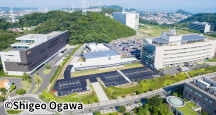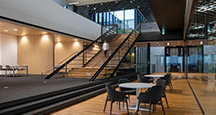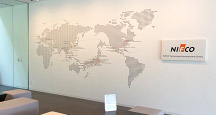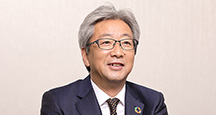Conducted in: July 2023

Masaharu Shibao (on the left)
President and CEO
Kumi Sano (on the right)
Executive Officer,
General Manager, Administration Division,
In charge of Human Resources, General Affairs, and Legal Affairs
We aim to maximize corporate value by creating an environment in which a diverse range of human resources can maximize their abilities.
Nifco's Long-term Vision is to become “a seamlessly growing global company with unique positioning and strong presence.” In this interview, we asked them about their views on human capital and the human resource strategies necessary to grow as a truly global company.
Q.What is your human resources strategy for achieving sustainable growth?
Shibao:
Increasing the engagement and motivation of each employee will lead to the growth of the company. When I started working, people used to ask “Can you work 24 hours a day?” So the way we worked and thought was different from today. However, the importance of people to the growth of a company did not change, and it is the same now. Employees are not a cost; they are capital. We will focus on maximizing added value by investing in human resources and working to sustain business growth and improve productivity by developing and enhancing employees' skills.
Sano:
For many years, I have been involved in business-related work and overseas marketing for a manufacturer of electrical products and electronic components. By a fortunate chance, I joined Nifco two years ago to oversee human resources, general affairs, and legal affairs. As you mentioned, when considering investments in human capital, I think it is important to clarify how it can be connected to the company's performance and sustainable growth.
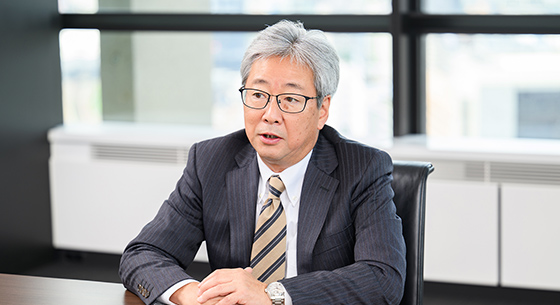
Shibao:
Since the way of proceeding differs from company to company, we must come up with measures that are not in textbooks. How can we successfully solve this equation and communicate it to our employees? I would like to think about that as well.
Our Mid-term Management Plan calls for focused investment of management resources to create new businesses and products and strengthen existing businesses. How we develop human resources is also important for our growth as a global company.
Sano:
Our human resources strategy in the Mid-term Management Plan is based on three pillars: human resources development, diversity, and engagement, and we will implement measures in each of these areas. We believe that our human resources strategy is to raise the potential of our diverse human resources to the highest level possible, and by creating a workplace with high engagement, we can maximize the abilities of each employee and link them to productivity and output. The same applies to our overseas offices.
Shibao:
Nifco has 42 locations around the world, and each country and culture has its own way of thinking about careers, so I feel that a different approach is necessary for each location. While a job-based personnel system is the norm in other countries, it will not work if we adopt the Western style in Japan, so we are currently working on establishing a job-based personnel system that follows the Nifco style by integrating the good points of the job-based system.
Q.You mentioned the word “diversity.” We would like to ask you a little more about that.
Shibao:
The automotive industry, which is now the mainstay of our business, has entered a period of such uncertainty that it has been called “a once-in-a-century period of great change.” Under these circumstances, I feel that ideas cannot keep up with the changes in the times if we only use what we have cultivated up to now. It is necessary to create an environment in which human resources with diverse perspectives can play an active role, and I believe that this is where the next growth strategy will emerge.
Sano:
As the president has mentioned in the Mid-term Management Plan, it is necessary to promote the development of new businesses not only in the automotive domain but also in the other domains. To do so, it is necessary to think with a new perspective that is not an extension of the past. We are preparing development opportunities to gain such perspectives.
Shibao:
We need diverse perspectives in order to take the next step. If people and companies are satisfied with the current situation, they will not be able to recognize change, and growth will come to a standstill.
Q.What specific diversity goals and indicators do you have in mind?
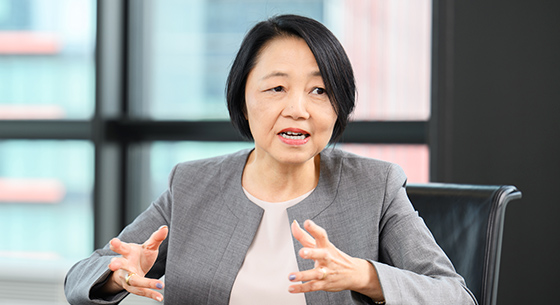
Sano:
I have been involved in diversity for many years. Diversity is not only the promotion of women's activities. We pay close attention to three indicators of diversity in our company: mid-career, foreign nationals, and female employees. Of these, mid-career employees comprise more than 30% of our workforce and over 30% are in managerial positions. In addition, the percentage of employees who are foreign nationals exceeds 4% and more than 4% are in managerial positions. These figures are comparable to the average for Japanese companies. On the other hand, the percentage of women in managerial positions is 6.3%. Considering that female employees comprise 15% of the entire company, there is still room for improvement.
We are working toward our goal of raising the rate to 10% by the end of FY2027.
Shibao:
Disclosing differences in wages between men and women has been mandatory since this fiscal year, and while there is no difference in treatment between men and women within each grade, there is a large overall difference between men and women. This is due to the current low percentage of women in management positions.
Sano:
As you mentioned, the ratio of women varies by grade, so looking at regular employees as a whole, the wages of women are less than 70% of that for men. We believe that this gap will narrow as the number of female managers increases. However, this does not mean that we should attract and train only female employees or promote only female employees earlier in order to achieve a certain benchmark, but we are seeking sustainable measures, such as promoting training from an early stage in consultation with the top management of each business unit.
Shibao:
The rate of men taking childcare leave has also increased.
Sano:
Yes, the rate of male employees taking childcare leave has improved dramatically to over 40%. Looking at the details of leave taken, I see that it is taken in units of several weeks, and I feel that it has really taken root. In the future, we would like to make it possible for all employees who wish to take childcare leave to do so. We are also promoting the activities of people with disabilities, and LGBTQ+ policies are also in progress. In April of this year, we revised our employment regulations to apply the same system to both same-sex and opposite-sex partners and treat them as spouses regardless of their marital status if they meet certain conditions.
Q.What kind of human resources do you need to grow as a global company?
Shibao:
The keywords “challenge,” “change,” “future,” “collaboration,” and “conquer” are listed as requirements for globally active human resources, and the driving force behind these keywords is passion. This is common to all human resources, not just global human resources. It is important to cultivate this kind of mindset in addition to language, knowledge, and skills.
Sano:
What is required of global human resources does not seem to have changed significantly from 20 or 30 years ago. When I was posted overseas in my previous job, we had daily discussions to achieve our goals based on understanding and respecting each other's values, history, and culture. The idea of diversity required in such a situation was and still is the same, and I think it is also very important to have on-site experience. We have an overseas trainee system under which we dispatch Japanese employees to our overseas offices.
Shibao:
Some people from overseas branches come to Japan through that trainee system. We believe that this system encourages interaction among employees and groups and leads to growth.
Sano:
The duration of the program is one year, but we have received many requests from those training overseas to extend the program. Those who are sent as trainees, even for one or two years, have grown a lot.
Shibao:
Having experienced working overseas through the trainee program, many of them want to be posted overseas.

Sano:
Looking back on my experiences, the time I grew the most was when I was assigned overseas. I feel that I have grown tremendously by working in different cultures, so I would like everyone to experience various things and grow, and I believe that this will lead to the growth of the company as a whole.
Q.What is the system of human resource development and training? Also, is there any way for those working in Japan to experience a different corporate culture?
Sano:
As for our human resource development and training system, we have a variety of programs in four categories: company-wide, level-based, self-development, and selective training, and we implement these programs while listening to the opinions of our employees. I feel that it is very important for employees to select programs based on their own career paths. As a program that allows employees to learn new and different perspectives, we also have a study program at other companies that allows employees to work at a company of their choice.
Shibao:
I joined Nifco as a new graduate and have been with the company all my life, but those who know other companies can look at the company objectively. In a sense, the domestic and overseas offices within the Group have the same culture, so I think the study program at other companies is very good in terms of gaining new perspectives.
Sano:
Recently, more and more companies are introducing outside study programs.
Shibao:
The opportunity to learn about the different cultures of other companies is important. Although limited to designers, we also have a program where employees are transferred to various automakers as guest engineers. It is a good experience to learn about customers and the industry and to see the strengths and weaknesses of our company. Some of our guest engineers have told us that they have a new appreciation for Nifco's free corporate culture and its advantages.
Q.In implementing your various policies and programs, is there anything you do to increase employee engagement?
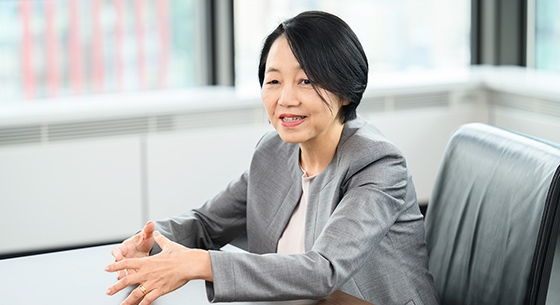
Sano:
Every two years since 2020, we have been conducting a survey (the Employee Engagement Survey) of employees at all of our global locations. The second survey was conducted in the fall of 2022. We analyze the survey results, summarize each organization's strengths, weaknesses, and future measures, and we follow up with the relevant personnel. Although the survey is conducted by Human Resources, the results are fed back to each base and business unit, and the head of each division formulate action plans and make improvements. For example, based on the results of the first survey, we began holding town hall meetings for the president to provide opportunities for employees to communicate with management. The president travels to locations throughout Japan to brief local employees on the company's performance and the Mid-term Management Plan and answer questions they may have.
Shibao:
It is a very meaningful experience each time, with employees offering a variety of opinions and suggestions. It reminds me of the time when I was a sales manager who used to go around to each base to talk with staff. At that time, the drinking party was the place to exchange opinions, but this has become a new place for communication.
Sano:
When we held a town hall meeting at Nagoya Plant, we received a request from an employee to install a vending machine so that he could purchase snacks and drinks after hours in the company cafeteria, and the president and plant manager decided to install the machine on the spot. I heard that vending machine has a very high usage rate.
Shibao:
Improving the working environment is important, and we have the conditions to do it flexibly. Human capital will continue to be discussed at the board meetings as an important management issue. On the other hand, in order to be effective, it is also important to make sure that employees in the general manager class are well aware of the company's policy. I believe that there will be a variety of opinions in the course of day-to-day efforts, and it would be better to have a forum for discussions.
Sano:
You are right. HR systems and policies will not work unless they are created together with the head of each division and employees in the general manager class. Human resources take the lead, but we are working together with the heads of the frontline organizations so that they can work with the same perspective.
Q.Nifco also has a telework system. How do you really feel about it?
Sano:
We are reforming our work styles to create a workplace environment in which a diverse range of employees can work with vigor and enthusiasm. Reducing the prescribed working hours, introducing flextime and teleworking, and increasing the degree of freedom in the way employees work will lead to higher engagement. However, since we are a manufacturing company, there are locations and operations where teleworking is difficult, and we are always thinking about how to create an environment that enhances engagement.
Shibao:
Nowadays, people can work anywhere as long as they have a computer and internet access. I also telework two days a week. When I first started teleworking, I was skeptical about whether I could really do my job remotely. I do the work I can do alone at home, and on the days I come to work, I concentrate on meetings and discussions.
Sano:
How do you spend the time you have gained from increasing productivity?
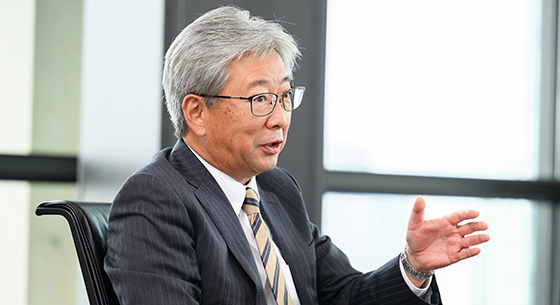
Shibao:
When I have time, I read. Books are not only a fountain of knowledge, they also allow me to touch the landscapes and subtleties of life depicted in print and expand my imagination. It never fades away. If I am interested in something I read in a book or newspaper or hear about from others, I do further research and sometimes even go to the site. Most recently, I visited Amakusa City in Kumamoto Prefecture, the setting of Shusaku Endo's book Silence. The book was recommended by one of the external directors of the company.
I tell new hires to just read books and travel and then learn English.
Sano:
You mentioned that at this year's induction ceremony. Anyway, it shows an amazing energy to go on a trip based on a book you read!
Shibao:
There is an abundance of information on the internet, including social networking sites. It is necessary to make correct judgments without being misled by such information, but that is not easy. I believe that what I see and feel is the truth, and by having various experiences and building up knowledge about the truth within myself, I can develop an eye for discerning the truth from information. I was deeply moved by the words of Mother Teresa that I saw in a newspaper the other day, and I wrote them down in my journal.
“Your thoughts become your words; your words become your deeds; your deeds become your habits; your habits become your character; your character becomes your destiny.”
These words are truly thought provoking.
I would like to follow the life of Mother Teresa in India and post these words to share them with you all someday.
Q.Finally, do you have a message for your employees, investors, and other stakeholders?
Sano:
In the future, people will be required to think independently about their own careers and grow by their own efforts. I intend to prepare a system and structure to support this as a company. I want each and every employee to have an ideal and to move forward with a goal. On top of that, we are trying to create a workplace where a diverse range of people can make the most of their talents. I believe that there are still areas where we are lacking, so I would like to encourage all employees to express their opinions without hesitation, and I look forward to working together to create the ideal workplace.
Shibao:
For our investors, we will continue to invest in human capital to achieve sustainable growth. As a result, we will create new businesses and products to increase our global competitiveness and generate profits, and we will consider how we can provide feedback to society. On the other hand, I hope that each and every one of our employees understands the meaning of the company's investment in human resources and will actively take on new challenges.
- CEO: Nifco's Sustainability Management
- General Manager of Finance & Accounting Department: Financial Strategies to Support ESG Management
- Message from Outside Directors
- Roundtable Discussion: Between the President and Employees Involved in Technology
- Dialogue: Next-generation Growth Strategies Focused on Solving Social Issues
- Dialogue: Nifco's Response to Climate Change

